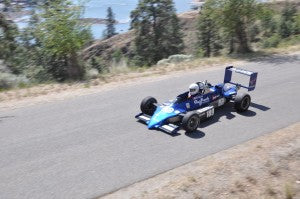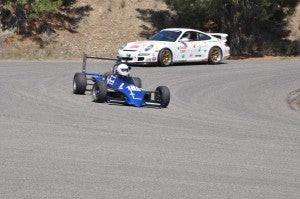The University of British Columbia’s E-Racing team had prepared for a year for the Knox Mountain Hillclimb – an 800 foot climb, two mile course historically the stomping ground of the gasoline powered car.

UBC E-Racing’s 1984 Reynard Formula Ford turns a corner in the Knox Mountain Hillclimb.
The engineering design team had a 1984 Reynard Formula Ford car, origionally with a 2.0L Ford Pinto engine that was used in the Formula Ford class of road racing, which they modified for the race.
“What our team did was an electric conversion of the car,” said Theo Noyes, president – UBC E-Racing. “We left the chassis and suspension mostly unaltered and changed out the powerplant to a DC electric motor. We built our own hardware for mounting the motor and the battery boxes and the external pods they are housed in we built in house.”
The team also does all their own maintenance, this year completing a total overhaul of the chassis.
“The car produces about 72 horsepower at the moment, but because it is very light, it’s still reasonably fast,” Noyes said. “On a tight AutoCross course, we are actually pretty competitive.”
The car competes in two different types of racing, hill climbs and AutoCross. Both are time trial type races, meaning one car goes through the course at a time.
“We almost exclusively race against gasoline cars,” Noyes said. “Though once we had a Tesla show up for an event.”
With the Knox Mountain Hillclimb closing in, the team was getting their car ready and batteries were high on the priority list.
“The batteries are the sole power source for the DC drive motor,” Noyes said. “We used 24 LiPo 5450 22.2V packs wired together to propel the car up a two mile course, which climbs 800 feet.”
Noyes said the team ended up using MaxAmps.com batteries as a last resort, because another battery company had taken too long to get their batteries

The 1984 Reynard Formula Forrd car has a DC electric motor and produces about 72 horsepower.
delivered.
“With very little time left, we contacted MaxAmps on the suggestion of another UBC student team,” Noyes said. “We were able to get batteries on short notice and delivered in time for us to make the hill climb we’d worked all year to prepare for.”
Noyes said he was also pleased to find the batteries were half the weight of the batteries they had originally tried to order, with the same voltage and capacity.
“The funny thing is, the way that electric motors work is actually very well suited to racing,” Noyes said. “They produce a lot of torque and are pretty light compared to a gasoline engine.”
Electric cars have a strong future, Noyes explained, and they are a possible answer to a commuter vehicle.
“We aren’t even trying to show that we are a replacement for gasoline cars, but that electric cars present a new frontier for car technologies and racing,” Noyes said.
The UBC E-Racing team placed 47th out of 61 competitors in the Knox Mountain Hillclimb, which takes place in Kelowna, British Columbia. The team’s car was the first electric car in race’s over fifty-year history.

